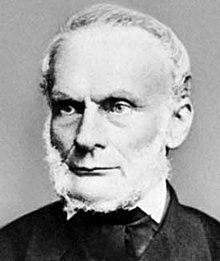Rudolf Clausius
| Rudolf Clausius | |
|---|---|
 |
|
| Born |
2 January 1822 Köslin, Province of Pomerania, Prussia (present-day Koszalin, Poland) |
| Died | 24 August 1888 (aged 66) Bonn, Rhine Province, Prussia |
| Nationality | German |
| Fields | Physics |
| Known for |
Second law of thermodynamics Originator of the concept of entropy Clausius-Mossotti relation Clausius-Clapeyron relation Clausius theorem Virial theorem |
| Notable awards | Copley Medal (1879) |
| Signature | |
Rudolf Julius Emanuel Clausius (born Rudolf Gottlieb; 2 January 1822 – 24 August 1888), was a German physicist and mathematician and is considered one of the central founders of the science of thermodynamics. By his restatement of Sadi Carnot's principle known as the Carnot cycle, he put the theory of heat on a truer and sounder basis. His most important paper, On the Moving Force of Heat, published in 1850, first stated the basic ideas of the second law of thermodynamics. In 1865 he introduced the concept of entropy. In 1870 he introduced the virial theorem which applied to heat.
Clausius was born in Köslin (now Koszalin in Poland) in the Province of Pomerania in Prussia. His father was a Protestant pastor and school inspector, and Rudolf studied in the school of his father. After a few years, he went to the Gymnasium in Stettin (now Szczecin). Clausius graduated from the University of Berlin in 1844 where he studied mathematics and physics with, among others, Gustav Magnus, Peter Gustav Lejeune Dirichlet and Jakob Steiner. He also studied history with Leopold von Ranke. During 1847, he got his doctorate from the University of Halle on optical effects in the Earth's atmosphere. He then became professor of physics at the Royal Artillery and Engineering School in Berlin and Privatdozent at the Berlin University. In 1855 he became professor at the ETH Zürich, the Swiss Federal Institute of Technology in Zürich, where he stayed until 1867. During that year, he moved to Würzburg and two years later, in 1869 to Bonn.
...
Wikipedia
